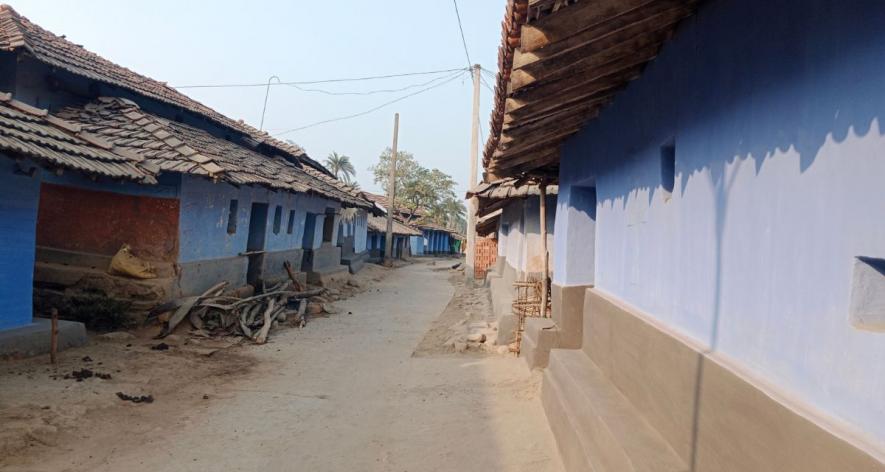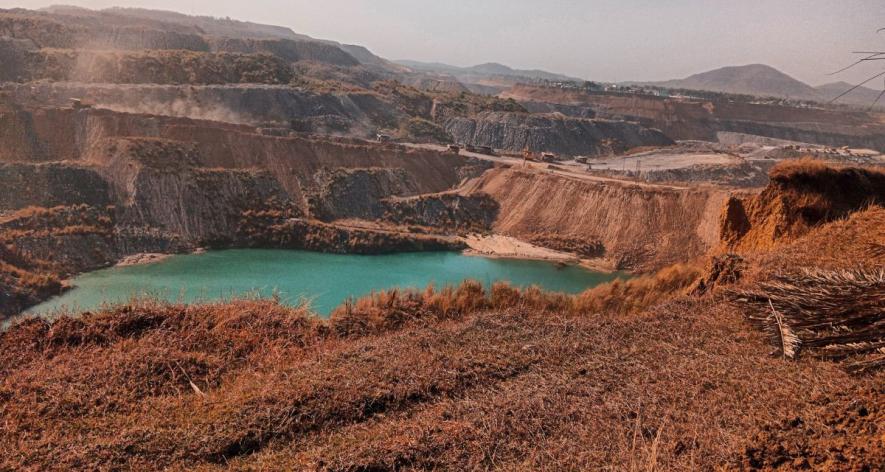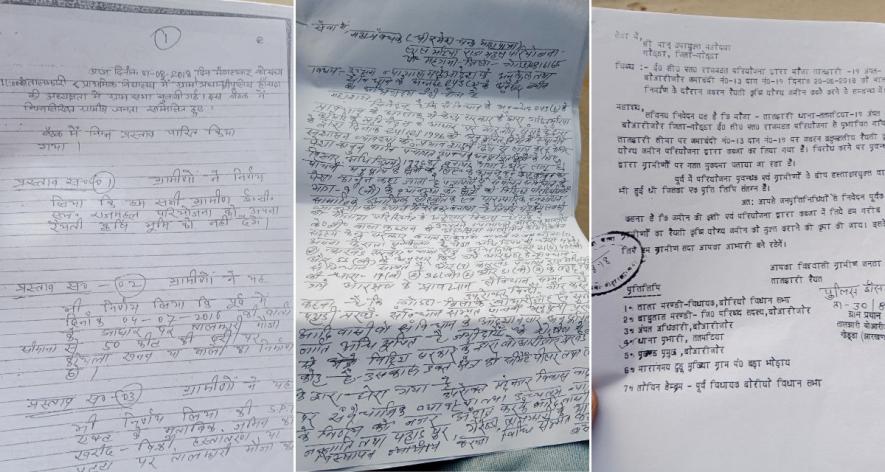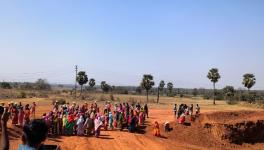Tribal Laws Flounder as Coal Law Puts Jharkhand’s Taljhari on Mining Map

Taljhari is categorised as a Scheduled Area due to its indigenous-majority population but without PESA, the panchayat is unable to exercise any of the special powers (Photos- Rahul Singh, 101Reporters).
Godda, Jharkhand: Eastern Coalfields Limited (ECL), a Government of India undertaking, has been locked in a bitter six-year battle against strong local opposition to its Rajmahal Opencast Coal Project (OCP) in Jharkhand's Godda district. At the heart of the conflict lies the village of Taljhari, where local farmers view their land as their sole means of sustenance.
Production at the Rajmahal OCP has been significantly affected due to protests, while the company is facing immense pressure to supply more coal to the power stations of NTPC Limited. Lack of coal production has also impacted the ECL's financial situation.
The protest peaked in the second half of January this year when the ECL management and Godda district administration faced strong resistance from the villagers amid heavy police presence. The residents claim their village falls in the Scheduled Area, but the ECL has a different point of view.
“We acquire land under the Coal Bearing Areas (CBA) Act. How does the PESA apply here?” asked Ramesh Chandra Mohapatra, General Manager of the Rajmahal project of Eastern Coalfields Limited (ECL).
Delayed implementation of the Panchayats (Extension to Scheduled Areas) Act (PESA), 1996, in Jharkhand, is working against the indigenous residents of Taljhari, where ECL has been trying to acquire land to expand its mining operations.
Being a Scheduled Area due to its indigenous-majority population, Taljhari should have come under PESA, which bestows absolute powers upon Gram Sabhas (village councils) on several administrative matters, including land acquisition.
However, PESA is still not being implemented in Jharkhand 27 years after the law was passed by the Parliament. So, the residents cannot access the benefits of the legislation.
In March 2023, the government informed the state legislative Assembly that the process to implement the law would be completed soon.
“Twenty-seven years have passed since the enactment of the PESA. Yet, consecutive governments in Jharkhand have not attempted to frame rules for its implementation. Had the act been in place, Gram Sabha’s approval would have been mandatory for all kinds of land acquisition — be it for central, state, or corporate projects,” tribal rights activist Dayamani Barla told 101Reporters.
She claimed that the scope of land acquisition would have been reduced by at least 50% and that people in Taljhari would not have struggled if PESA had been in force.
Social activist Emil Walter Kandulna, who had approached the Jharkhand High Court in 2021 seeking implementation of PESA, agreed with Barla. When asked about the delays, Kandulna told 101Reporters that the state government “fears losing control over mining activities once PESA comes into force.”
However, even PESA provisions are ambiguous when it comes to mining. The act stipulates that “prior recommendation of the gram sabha or panchayats at the appropriate level shall be made mandatory for grant of concession for the exploitation of minor minerals by auction.”
Yet, there are no clear provisions regarding major minerals such as coal anywhere in the PESA gazette notification. That is why ECL official Mohapatra said that the Coal Bearing Areas (Acquisition and Development) Act, 1957, takes precedence when it comes to acquiring land for mining.

Unequivocal and well-grounded laws like the Coal Bearing Areas Act and the Land Acquisition, Rehabilitation and Resettlement Act supersede(Photos - Rahul Singh, 101Reporters)
The CBA Act does not seek prior and informed consent of the project-affected communities or individuals. It imposes the government’s will. Under Section 4(1) of the act, the central government can take the first step for land acquisition by declaring its intention through official notification in the government gazette. Once the declaration is published, the government will have absolute rights over those lands.
Even if the acquisitions were for other development projects, the laws would have been no help to the residents of Taljhari. The Land Acquisition, Rehabilitation and Resettlement (LARR) Act, 2013, which is activated in such cases, calls for the consent of 80% of owners for land acquisition for private projects. For public-private partnership projects, it is 70%. However, for government projects, no such consent is required.
So, are there no specific laws to regulate outside interference in indigenous-majority areas? There are. Provisions of PESA have been embedded in the Panchayati Raj (village self-governance) system in the Scheduled Areas of Jharkhand. However, they are vague and improperly implemented.
In contrast, the provisions of the CBA Act give total power to coal ventures to acquire land. Even the LARR Act is a powerful tool. Therefore, irrespective of the rules and regulations offering protection to tribals or Scheduled Areas, other well-grounded laws supersede them.
Ground Realities:
The authorities at present are trying to complete all formalities in Taljhari in accordance with the special powers applicable in Scheduled Areas under the Fifth Schedule of the Indian Constitution. The provision makes it mandatory to get clearance from the village council. A council meeting was organised in Taljhari on May 2, 2023, to prepare the genealogies of residents to confirm land ownership.
“Land will be acquired in a legal manner. We are preparing a genetic table to complete the formalities," said Mahagama sub-divisional officer Sourav Kumar Bhuvaniya, without divulging whether Gram Sabha's approval was mandatory for land acquisition. He admitted that a law and order problem exists in Taljhari, which the administration is trying to address.
“We will complete the process as per the best method available under the law,” Bhuvaniya asserted.
On being asked whether the Gram Sabha procedure for land acquisition was completed, the seniormost local bureaucrat, Godda deputy commissioner Jishan Qamar, did not respond.
Meanwhile, the genealogy preparation has hit a rough patch. Many villagers complained about mistakes. “This exercise was taken up several times after issuing notices to the Gram Sabha. But the villagers simply do not cooperate,” said an official, speaking on the condition of anonymity.
Residents fear that cooperating with any procedure related to land acquisition can put them in harm's way. They think the authorities will produce a document suggesting that the Gram Sabha has approved the project, and then they will not have any legal standing to take their case forward. For the same reason, the villagers had in 2018 passed a Gram Sabha resolution not to provide land for coal mining and sent a copy to the district administration.

The administration's attempt to prepare genealogies of residents to confirm land ownership is proving difficult with people refusing to cooperate with any land acquisition formalities (Photos- Rahul Singh, 101)
According to Lakhan Lal Mahto. general secretary of the United Coal Workers' Union, affiliated with the All India Trade Union Congress, coal mining activities in Scheduled Areas have been relatively low in Jharkhand. “The conflict situation in Godda district is due to the entry of the coal company into the Scheduled Area,” he said.
The ECL had set a target of rehabilitating Taljhari villagers for its mining project expansion in 2021-22, but failed. To scale up its operations and generate more revenue to offset back-to-back losses, the company is working on a strategy of operationalising discontinued/abandoned mines through a revenue-sharing model and offering more mines to private firms under the Mine Developer and Operator model.
ECL is trying to acquire land by offering jobs, land to build houses, and compensation to Taljhari residents. An official with the Rajmahal project said that 22 people from 22 families who gave land for coal mining have received government jobs, and the process of appointment is going on, while some people are also working on a contract basis.
For every two acres (0.8 hectares) of land provided, ECL employs a member of that family. In addition, five decimals (0.0202 hectares) of land will be given for building a house. For houses located on the acquired land, compensation will be paid according to a schedule of rates by the Central Public Works Department. For agricultural lands, compensation is as per the registry rate of the village, a minimum rate set by the government for a piece of land.
But instead of compensation, residents want rules that can block land acquisition sans consent. That will require an answer to the complex question – what is stronger in law, the CBA Act or the special provisions for Scheduled Areas?
Taljhari residents’ struggle to stay put will continue till this question is answered.
Read the first part of this report here.
(Rahul Singh is a Jharkhand-based freelance journalist and a member of 101 Reporters, a pan-India network of grassroots reporters)
Get the latest reports & analysis with people's perspective on Protests, movements & deep analytical videos, discussions of the current affairs in your Telegram app. Subscribe to NewsClick's Telegram channel & get Real-Time updates on stories, as they get published on our website.























